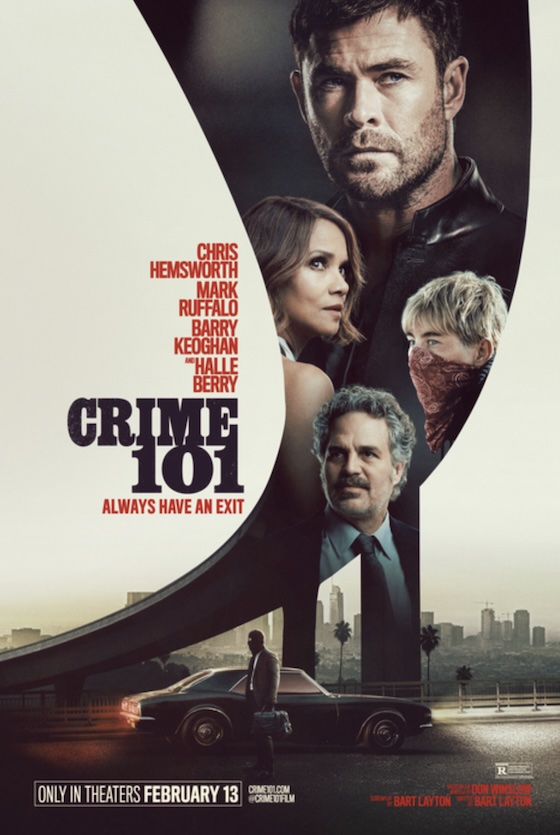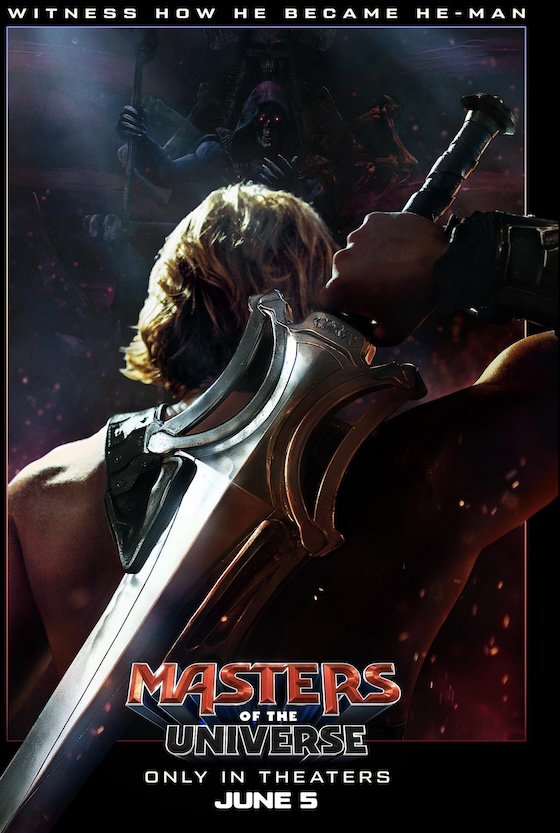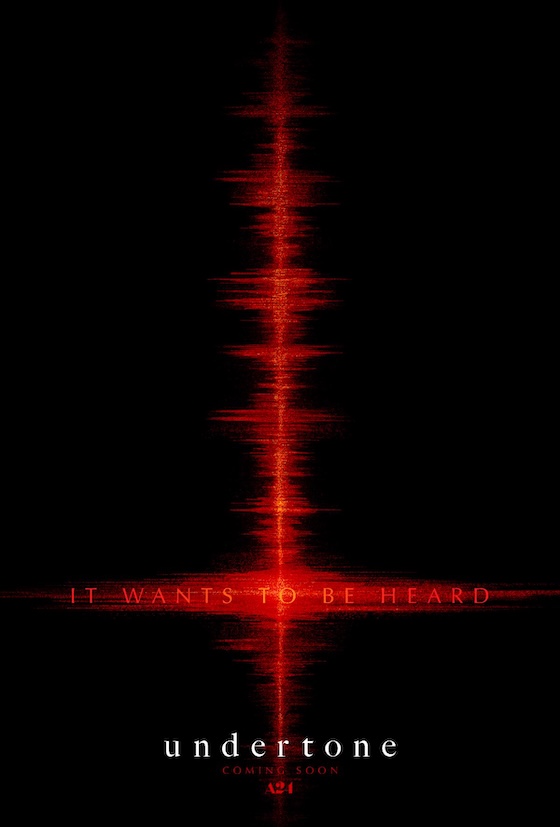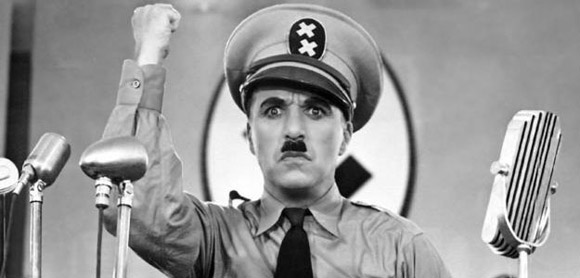
In Charlie Chaplin’s two-role classic, The Great Dictator, we get his final salute to the silent films of his youthful exploits and the first words ever spoken by The Tramp. It’s a haunting film; one that mocks Hitler and dictators in general (before it was en vogue to do so) and one that echoes his sentiments as a socialist in his call-to-arms speech that anchors the film. Nominated for several Oscars – including Best Film and Best Actor – Chaplin’s The Great Dictator suffers only in its duplicity and predictability, being one of the emotionally simplest of his films.
The Tomanian War opens the film. After a series of silent gags focusing on a silly-looking war private (Chaplin) who loses his memory after surviving the crashing of an airplane, the comedy settles into a relatively straight-forward narrative about that private, now a simple-minded barber, and his daily life in the ghetto verses the troubles brought about by the rising power and influence of dictators Hynkel (Chaplin again) and Napaloni (Jack Oakie), leader of Bacteria.
Parodying the policy and powers of Hitler, Chaplin breathes life into the idea of social commentary and exploits the image of Hitler and dictators like him by presenting them as children throwing tantrum over his toys. Co-starring the beautiful Paulette Goddard, The Great Dictator plays almost like a Greatest Hits package of material from Chaplin when, taken as a whole, suffers only a bit in its own shallowness.
We can forgive Chaplin, though. The jabs at Nazi Germany’s expense are certainly well-placed and much deserved. We can also suggest that Chaplin doesn’t disguise his hatred for Hitler; his ballet with the globe is dripping with irony and criticism. It’s perfect. Seldom do scenes work as powerfully as that performance and, considering the working environment surrounding the making of the film, The Great Dictator soars in form and function as a social piece of cultural criticism.
Conflicted by the dominance of sound, there was little future for his character of The Tramp; a character he hated to give voice to. The Great Dictator does exactly that and ends with The Tramp’s message to his audience. It’s one of socialism and one of strength. One of perseverance in the face of tyrannical governments and does inspire with its power to the people message. Of course, this is something The Tramp would believe in and, after a careful study of his films, certainly a voice in keeping with the The Tramp’s filmographic exploits in shorts and features.
This is one of the greatest satirical works ever, yet as a complete narrative it stumbles a bit. Not to be concerned, though. It still makes its mission clear: Power to the people indeed.
![]()
Film Details
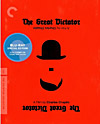 MPAA Rating: This title has not been rated by the MPAA.
MPAA Rating: This title has not been rated by the MPAA.
Director: Charles Chaplin
Writer: Charles Chaplin
Cast: Charles Chaplin; Jack Oakie; Reginald Gardiner; Henry Daniell; Billy Gilbert; Grace Hayle; Paulette Goddard
Genre: Classic | Comedy | Drama | War
Tagline: Chaplin talks... while You Laugh ! His greatest comedy since "Shoulder Arms" and "the Gold Rush" !
Memorable Movie Quote: "We've just discovered the most wonderful, the most marvelous poisinous gas. It will kill everybody."
Distributor: United Artists
Release Date: March 7, 1941
DVD/Blu-ray Release Date: May 24, 2011
Synopsis: In Chaplin's satire on Nazi Germany, dictator Adenoid Hynkel has a double... a poor Jewish barber... who one day is mistaken for Hynkel.
Blu-ray Review
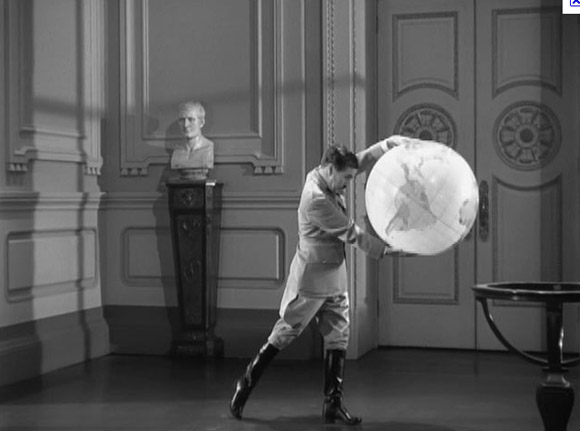
|
||||||||||||||||||
Blu-ray Details:
Available on Blu-ray - May 24, 2011
Screen Formats: 1.37:1
Subtitles: English SDH
Audio: English: LPCM Mono
Discs: 50GB Blu-ray Disc; Single disc (1 BD)
Playback: Region A (locked)
With only the slightest of augmentation, Criterion presents The Great Dictator using the same restored master, courtesy of French distributors MK2, for their release. Black levels are strong and consistent throughout. Grays, slightly stronger here, pop with grain and enhance the balance of the black and white classic. The English LPCM 1.0 track (the only audio track provided) is as clear as the picture and transferred at 24-bit for optimum performance.
Supplements:
Commentary:
- There is a rich commentary, newly recorded for this release in 2011, provided by performer and author Dan Kamin and silent-film historian Hooman Mehran is both delicious with tribute and knowledge about the film. A must-hear for fans of Chaplin and of the film. These two know their stuff.
Special Features:
As with any Criterion release, the supplemental material is part of the joy in owning the film. Here, they continue to dominate with a wealth of material that covers all aspects of the film and its star. There is an outstanding feature-length documentary comparing the fascinating similarities between Hitler and Chaplin as well as some great home footage – supplied by Sydney Chaplin – of Chaplin on set; it’s fascinating to see in color.
- Trailer (2 min)
- The Tramp and the Dictator (55 min)
- Visual Essay: Chaplin's Napoleon (20 min)
- The Clown Turns Prophet (21 min)
- Sydney Chaplin's Footage (27 min)
- King, Queen, Joker (5 min)
- Two Shaves (3 min)
- Charlie the Barber (8 min)

